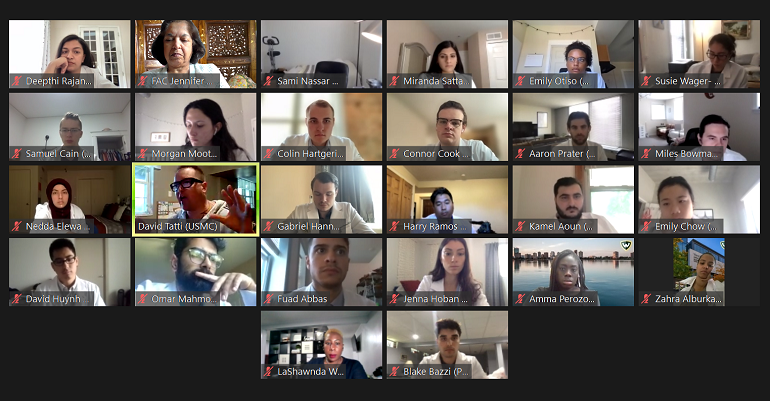
In what has become an annual educational gathering of medical students and members of the United States military, Wayne State University’s physicians-in-training once again met with a panel of veterans to showcase the individual challenges the vets face receiving quality health care from both civilian and government-provided entities.
Medical students from the Class of 2024 met the veterans virtually June 10, utilizing Zoom to break into smaller learning groups, as part of the School of Medicine’s Population, Patient, Physician and Professionalism Course directed by Associate Professor of Pediatrics Nakia Allen, M.D. Students from other health care professional programs at WSU joined them, including the social work, occupational therapy, physician’s assistant and pharmacy programs. In total, 424 students, 21 veterans and 18 facilitators participated in the panel.
The goal of the event was to ensure students continue to understand the social and economic impacts of health care on veterans. Fourth-year medical student Mike Franklin was one of several panel facilitators.
“It highlighted the significant lack of access to quality care that veterans face, especially veterans who do not live in urban areas. The veterans also highlighted how important it is for providers to screen for mental health issues, as many veterans have a ‘warrior’ mentality and do not speak about or show their symptoms related to mental health,” Franklin said.
The panelists shared their stories and experiences through a series of questions asked by the students and moderators, and identified strengths and assets that they and their family members have. Some also discussed the barriers and challenges they faced or continue to face in reintegrating into civilian life, work and school. Additional student questions and discussion topics included from where the veterans seek the majority of their health care, any chronic health conditions or injuries caused by their service, mistakes providers make in their approach to treating veterans and ways students could help to improve care they receive.
“We learned who they are as people first, which guided our discussion of the health care they received. I also saw pre-clinical students increase their curiosity around our patients’ experience, which is so necessary for pre-clinical students,” Franklin added. “Veterans have a completely different experience than civilians, and have an unspoken bond that civilians like myself will never understand. Hearing the conversations among veterans before and after the session, I began to understand how their experience sharing their stories with students has actually helped them build a sense of community.”
Eugene Applebaum College of Pharmacy and Health Sciences Associate Professor of Pharmacy Practice Aline Saad, Pharm.D., also led a panel. She is director of her unit’s Faculty Development, coordinator of Interprofessional Education and IPE Champion with the Michigan Area Health Education Center.
“This was an excellent experience that nicely complemented our curriculum with a focus on the health care needs of veterans. Students learned about veterans, their journeys, their needs and chronic diseases in an interprofessional setting. Students reflected on how best to tailor acquired pharmacy knowledge and skills to care for this population,” Dr. Saad said. “The sessions culminated with an interprofessional case-based activity (on June 17) that provided students the forum to work together and share decisions in developing a patient care plan.”
Participating veterans represented the U.S. Air Force, Army, Marines and Navy. They included Air Force veteran and Henry Ford Health System Nurse Manager Jeffrey Sanner, who led the first session of the Veterans Unit on June 3, as well as Joseph Booza, Sandie Wilson, Sharon Sykes, Kevin Scott, Jessica James, Nace Tasby, Ronald Kirchner, Douglas Howell, Henry Storm, Michael Paletta, Ed Ruckle, Ashley Marang, Ryan Oke, Dan Rickard, Yul Allen, John Eley, David Tatti, Wayne Morris, Drea Jones and Guy Reece.